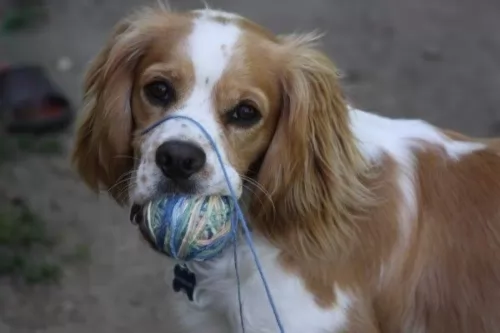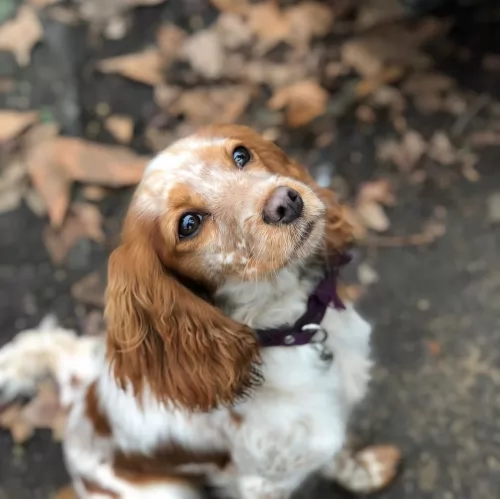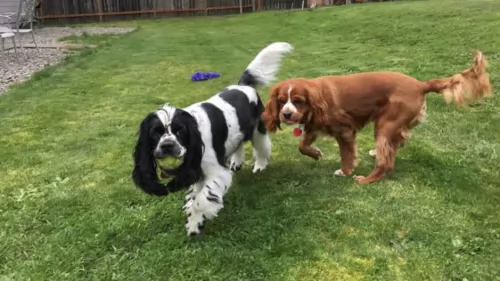 Petzlover
Petzlover English Setter is originated from United Kingdom but Cockalier is originated from United States. English Setter may grow 31 cm / 13 inches higher than Cockalier. English Setter may weigh 68 kg / 150 pounds more than Cockalier. Both English Setter and Cockalier has same life span. English Setter may have more litter size than Cockalier. Both English Setter and Cockalier requires Moderate Maintenance.
English Setter is originated from United Kingdom but Cockalier is originated from United States. English Setter may grow 31 cm / 13 inches higher than Cockalier. English Setter may weigh 68 kg / 150 pounds more than Cockalier. Both English Setter and Cockalier has same life span. English Setter may have more litter size than Cockalier. Both English Setter and Cockalier requires Moderate Maintenance.
 The English Setter seems to have been a hunting dog in England as far back as the 15th century. These dogs were known to be ‘setter types’ – hunting dogs that ‘set dogges’ – to set or point at game birds. It is believed that the English Setter is a cross of the Water Spaniel, Spanish Pointer and English Springer Spaniel. In the late 1500’s Sr. Johannes Caius, a sportsman, announced to his friends that there was a new dog our of France for hunting. He then describes an English Setter.
The English Setter seems to have been a hunting dog in England as far back as the 15th century. These dogs were known to be ‘setter types’ – hunting dogs that ‘set dogges’ – to set or point at game birds. It is believed that the English Setter is a cross of the Water Spaniel, Spanish Pointer and English Springer Spaniel. In the late 1500’s Sr. Johannes Caius, a sportsman, announced to his friends that there was a new dog our of France for hunting. He then describes an English Setter.
Then in the early 1800’s Rev. Harrison of Carlise sold a couple of setters to Mr. Laverack. This pair is the foundation for the breed of English Setters. Without really knowing, Laverack claimed that this line he was breeding from had been pure for 35 previous years. He inbred his male and female for many years and did well in confirmation and field trials.
Then in 1874 the first English Setters were imported to the US from this Laverack line. Mr. Llewellin then crossed the best dogs in the Laverack line with his dogs and eventually produced winning champions Armstrong Dash II and Dashing Bondhu. This led to the “Dashing Bondhu” or the Llewellin line of English Setters. This is why the English Setter is sometimes referred to as the Llewelllin or Laverack Setter.
The setter group to which the English setter belongs includes the Irish Setter, the Gordon Setters and the Irish Red and White Setter. The English Setter, as well as the others, were bred to hunt birds such as pheasant and quail. It was the job of the setter to find the prey and point it out to the hunter after it had been shot. They were also used to flush the birds from the brush so that the hunter could then release hawks to take down the prey. The English Setter is methodical and systemic in their approach.
By the 1600’s this working dog had become the breed of the landed gentry and shooting game was their pastime. These nobles did not use hawks to capture the prey but rather shot them after the English Setter flushed them out. The English Setter is very popular today both as a hunting dog and as a family pet. The English Setter is bred for athleticism and endurance. The have both AKC and UKC certification.
 Known also as the Cockalier Spaniel, the Cockalier is a sweet crossbreed – a mix between the Cocker Spaniel and the Cavalier King Charles spaniel.
Known also as the Cockalier Spaniel, the Cockalier is a sweet crossbreed – a mix between the Cocker Spaniel and the Cavalier King Charles spaniel.
Both of these spaniels do have some differences. The Cockalier is a designer breed that hails from the USA. Because he is a hybrid breed the Cockalier isn’t recognized by the American Kennel Club, but as a hybrid, it is recognized by the American Canine Hybrid Club (ACHC).
 The English Setter is very much a setter in his looks. He is medium in size and was bred to hunt by following airborne prey over a large expanse of ground. He has to have both speed and stamina. He also has to run with his head up watching the prey in the air.
The English Setter is very much a setter in his looks. He is medium in size and was bred to hunt by following airborne prey over a large expanse of ground. He has to have both speed and stamina. He also has to run with his head up watching the prey in the air.
He has a slight dome shaped head and a long muzzle with dark, gentle eyes. The ears have their tips lined up with the eyes, the neck is long and muscular. He shows powerful hindquarters and a fairly long tail.
The coat length is medium and silk. The ears, chest, neck and legs are feathered, as is the tail. The hunting version has a shorter, finer coat than the show dog. The show dogs’ coats are flowing and long. Both types have a white coat with Belton or ticking. The Belton can be black, orange, lemon, liver and the tricolor. This is the liver or blue Belton but there are tan markings on the legs, chest, and face. It was Laverack who named the ticking Belton after a village in England.
 The Cockalier is a medium-sized dog standing at between 30 and 38cm in height and weighing roughly between 5 and 12kg.
The Cockalier is a medium-sized dog standing at between 30 and 38cm in height and weighing roughly between 5 and 12kg.
The coat of the Cockalier is silky and wavy. The coat is medium length and can be in colors such as golden, red, black or maybe white and brown.
The ears are fairly long and floppy, the eyes brown and expressive and the tail docked. If left, the tail is long and feathery.
The Cockalier is lively, gentle, intelligent and friendly with his human family, though he can be a little bit aloof with strangers.
He bonds very strongly with his family. They’re robust and are playful with children. They’re active dogs too and love nothing more than a hectic ball game. They don’t know when to stop and can become utterly exhausted if you don’t stop the game.
Have him trained and socialized and then he becomes even more amicable and he’s smart enough to learn basic commands without any trouble.
 The AKC standard for the English Setter breed describes him as a “Gentleman by Nature” and that might be all you need to know about this delightful dog. They are people-oriented and settle right down with their families if they get enough exercise. With proper stimulation they become couch potatoes when you bring them in at night.
The AKC standard for the English Setter breed describes him as a “Gentleman by Nature” and that might be all you need to know about this delightful dog. They are people-oriented and settle right down with their families if they get enough exercise. With proper stimulation they become couch potatoes when you bring them in at night.
They are very friendly with everyone but are especially happy when playing with children. You can trust them with your other pets, children of all ages and anyone coming to your front door. They are not guard dogs. However, they can have a stubborn streak, they can be strong-willed. This is especially true the more working than show stock they are. In addition, they are intelligent, calm and quiet in the house.
 The Cockalier is such a clever dog and he wants to please. He just loves his human owners, protecting them against strangers. He doesn’t take too kindly to strangers, preferring to devote all his love and loyalty to those he knows.
The Cockalier is such a clever dog and he wants to please. He just loves his human owners, protecting them against strangers. He doesn’t take too kindly to strangers, preferring to devote all his love and loyalty to those he knows.
He just craves attention and wants to be in your vicinity all the time. He is also good with children and will get on well with other pets in the home.
Once you’ve had a Cockalier in your life, you’ll want to reconsider having one of them again as they make awesome pets and companions.
 English Setters, like many other breeds that have a base white coat, can be affected by congenital deafness. A test done by LSU in 2010 showed the 12.4% of the dogs they tested were affected by this. They are also prone to:
English Setters, like many other breeds that have a base white coat, can be affected by congenital deafness. A test done by LSU in 2010 showed the 12.4% of the dogs they tested were affected by this. They are also prone to:
Most of this is caused by autoimmune thyroiditis or a condition where the immune system attacks its own thyroid gland.
The primary cause of death after ten years old
 The Cockalier is a healthy dog breed and can reach between 12 and 15 years of age. Look out for common canine health issues such as hearing loss and ear infection and vision issues.
The Cockalier is a healthy dog breed and can reach between 12 and 15 years of age. Look out for common canine health issues such as hearing loss and ear infection and vision issues.
Cockaliers that have an ear infection will shake their head and scratch their ears. The inside of the ears may be red and there may be an unpleasant smell coming from the ears. Your pet will need to see the vet.
This is a common disease with King Charles Spaniels where the mitral valve wears out and leaks and is associated with a heart murmur.
The earliest sign of a leaking mitral valve is normally a heart murmur, but it doesn’t mean heart failure is imminent, but congestive heart failure will eventuallt occur. Your dog will tire when walking, be lethargic and also have a cough. It will definitely be time to see the vet.
 The English Setter is a hard working dog and should be fed accordingly. Puppies should be fed three times a day and adults twice to avoid bloat. Watch your English Spaniel though as they love to counter surf.
The English Setter is a hard working dog and should be fed accordingly. Puppies should be fed three times a day and adults twice to avoid bloat. Watch your English Spaniel though as they love to counter surf.
In addition to the conditions listed above the English Setter is prone to:
Caused by excessive exercise before or after having eaten a large meal. It is suggested that you feed your English Setter twice a day, smaller meals and not right before or after strenuous exercise.
Keep her ears clean and check regularly for infections.
The English Spaniel needs exercise on a routine basis – every day walks are best along with some time to just run either in a fenced yard or dog park. Take her jogging, running alongside your bike, hiking or just long walks. They do well with lure coursing, agility, confirmation, obedience and rally.
 When you choose one of the commercially manufactured dog foods there are, you want to avoid those more inferior ones that have ingredients in them that can cause your dog to get sick.
When you choose one of the commercially manufactured dog foods there are, you want to avoid those more inferior ones that have ingredients in them that can cause your dog to get sick.
Look for the high-quality ones and choose the foods that have natural, wholesome ingredients in them. The vet can always help you with your decision to select a food that will of benefit to your pet.
Try to give your pet some good homemade food too such as some raw meat occasionally as well as boiled chicken, vegetables and brown rice. Fresh, cool water should be constantly available.
The Cockalier is going to require some brushing because he sheds quite a bit. Some dog owners prefer to get the Cockalier professionally trimmed. During grooming, check your pet over for any unusual lumps.
Your Cockalier will also need to have his nails trimmed, and because of the long ears, you will need to look inside the ears to ensure there is no redness and signs of infection.
Some dog owners don’t have the time or they don’t want to probe inside their pet’s ears and then a doggy-grooming-parlor can be a good idea as they do all this for you.
The Cockalier is an energetic dog, requiring a lot of exercise and games. These dogs love water games and will love you spraying him with water from the garden hose. Failing that, he’ll jump right into the swimming pool with you. Ball games are just up his street, and he will remind you every day that it’s time for his walk.